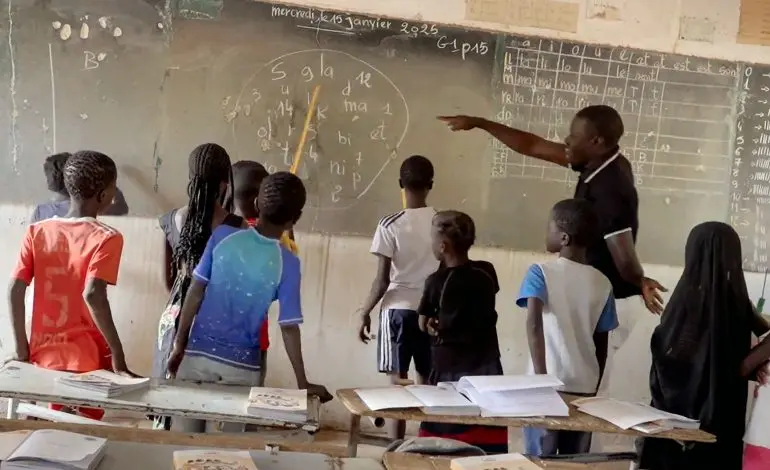The ARED association, founded in Senegal, has been awarded the prestigious Yidan Prize for its innovative methods of learning in multiple languages.
Mamadou Amadou Ly, head of the organisation Associates in Research and Education for Development (ARED), has become the first African to receive the 2025 Yidan Prize for Education Development, one of the most prestigious international awards in this sector.
According to the Yidan Prize Foundation, the Senegalese national is being honoured ‘for his contribution to removing barriers to basic education in West and Central Africa’.
Under his leadership, ARED has developed bilingual education models using national languages, which ‘significantly improve the basic reading, writing and numeracy skills of both school-going and out-of-school children’.
Mamadou Amadou Ly, according to the Foundation, has demonstrated the transformative power of teaching in languages that children know alongside the languages they need to learn and has presented a flexible path for bilingual education in West and Central Africa.
ARED’s teaching and learning materials are freely licensed and accessible to all on the Early Learning Resource Network. Its community-based and culturally appropriate approach has influenced national education policy in Senegal, Mauritania, The Gambia and elsewhere.
The Yidan Prize awards a prize of approximately $3.8 million, which must be used to fund specific projects. This leads Mamadou Amadou Ly to say that this award ‘will enable ARED to significantly accelerate its work, proving that bilingual, community-based, evidence-based and accessible education can bridge learning gaps and inspire public policy.’
Dorothy Gordon, chair of the jury, highlights the global significance of his achievements in promoting equity and inclusion in education. ‘Mamadou Ly’s visionary work in multilingual education provides methods that pave the way for literacy and offer opportunities to students around the world, while preserving linguistic and cultural identities. This path towards inclusive and equitable learning environments inspires education reform in Africa and beyond.’
Innovative solutions

For her part, Awa Ka Dia, programme director at ARED, reiterates the organisation’s approach: ‘Collaboration is at the heart of our success, because transforming education cannot be done alone.’ As a key technical partner of the Senegalese Ministry of Education, ARED conducts applied research and provides data to inform and strengthen national school curricula. Demonstrating their adaptability and potential for large-scale deployment, ARED’s free and open resources are also used in Mauritania and The Gambia.
It should be noted that the Senegalese professor is being honoured alongside Professor Uri Wilensky, winner of the 2025 Yidan Prize in the Education Research category. This professor of learning sciences, computer science and complex systems at Northwestern University is being recognised for his innovative work in the field of agent-based modelling, which promotes understanding of complex systems and bridges disciplinary knowledge. He has also developed a free, open-source tool, NetLogo, to facilitate a better understanding of complex phenomena, from climate change to pandemics and economic instability. This tool can be used by both young children and researchers.
The Yidan Prize therefore rewards change makers in the field of educational research and development whose work is forward-looking, innovative, transformative and sustainable. Professor Uri Wilensky and Mamadou Amadou Ly will join the Yidan Prize Laureates Council, a community of brilliant minds from research and practice who seek to collaborate, share opportunities and explore ways to create a better world through education. The laureates will be honoured at the Yidan Prize Award Ceremony to be held on 6 December in Hong Kong.
ARED is a non-profit organisation based in Dakar. Founded in 1990, it develops innovative bilingual education programmes and teacher training, and publishes teaching materials in national languages. Its work has strengthened literacy and promoted mother tongue education, influencing educational reforms in Senegal and throughout the region. ARED’s vision is for every learner to have access to quality education in their own language, while preserving their cultural identity and promoting community development.
Ndaw Wune
The gradual and iterative design process builds innovative solutions in collaboration with community members, national specialists, educators, and linguists. This work, which began in 2008 as a pilot project with the Senegalese government, has now been adopted as part of the national education policy. The models use a structured pedagogical approach, including comprehensive teacher training and high-quality, culturally appropriate learning materials, which allows students to begin learning in a language they know and then transition to learning in that language and in French. Active participatory learning, levelled learning groups and flexible classroom arrangements are fundamental to replacing traditional, now outdated, lecture-style teaching. In this way, the programme stimulates social-emotional learning and enhances creativity.
The remarkable impact of the programme is illustrated by the Ndaw Wune (Success for All) accelerated learning programme, an academic and extracurricular remedial programme for struggling second and third year students at risk of dropping out of school. The results are clear: in one year, Ndaw Wune students improved their reading skills by 74% in letter recognition, 100% in syllable reading and 134% in word reading. This shows, according to its promoters and the Foundation’s jury, that education systems can be more equitable and inclusive.
Crédito: Link de origem



Comments are closed.